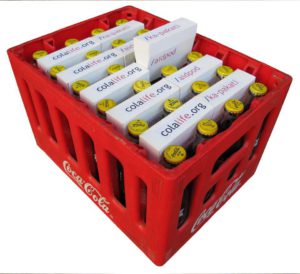
Description
ColaLife is improving access to medicine for diarrhoea treatment by creating products that truly suit the needs and constraints of people at the bottom of the pyramid. Built upon the observation of the global distribution of Coca-Cola products, the social enterprise ColaLife believes that the private market can be a source of inspiration to distribute healthcare in rural areas.
Context
Around half a million young children die each year from diarrhoea, that’s one a minute. We know how to treat diarrhoea – Oral Rehydration Salts (ORS) and Zinc – and this has been the recommendation since 2004. However, only 15% of cases get this treatment.
In 2019 WHO changed their advice and now recommend that ORS and Zinc be co-packaged. We are now working with others through the establishment of the ORS/Zinc Co-pack Alliance to accelerate the uptake of this new recommendation.
Technical details & Operations
See below but also, we consider the way we operate to be very important. We are interested in creating self-sustaining change. That is, change that is permanent and self-enhancing that survives the withdrawal of the resources that were used to create it. We work to six self-sustaining development principles:
- Plan for self-sustainability from the outset
- Don’t do anything that makes you or your organisation a permanent part of the solution
- Do everything through local systems and structures
- Build partnerships with the vision at the centre (not one of the partners)
- Respect government policy (seek to change it where it could be improved)
- Engage your intended beneficiaries from the very outset
For more detail see: https://outsight.international/blog/how-to-implement-self-sustaining-development-seven-essential-principles
Deployment & Impact
1986: Idea – Coca-Cola gets everywhere but life-saving medicines don’t. Why don’t we put medicines in Coke crates?
2008 to 2011: Globalise the idea and create a support network through social media and traditional media channels.

2012 to 2013: Co-distribution trial of co-packaged ORS and Zinc for diarrhoea treatment. Trial was successful at improving access to ORS and Zinc in remote rural areas but co-distribution found not to be necessary. In the trial the co-pack reached rural areas but only 4% travelled in Coca-Cola crates. The reason they got there was because ColaLife followed the lessons they learnt from Coca-Cola about how their distribution system works and applied these to the co-pack: aspirational product design; direct marketing to your target customers; putting the product into the distribution chain at a price that enabled everyone involved to make a profit and for the product to be affordable to your target customers. Essentially, you can get any commodity to anywhere in the world by creating & sustaining demand & making it profitable to supply the demand.
2013 to 2018: Scale-up in Zambia (commercial and public sectors).
2018 to date: Local manufacture and distribution on-going with no support from ColaLife. By the end 2020 1.36 million co-packs had been distributed saving an estimated 1,500 lives.
2018 to 2019: Instigated and led a successful effort by the Diarrhoea Innovations Group to get the WHO recommendation for diarrhoea treatment to co-packaged ORS and Zinc.
2020 to date: Working to accelerate the adoption of this new co-packaging recommendation.
2021 to date: Working with JustActions.org to establish the ORS/Zinc Co-pack Alliance (ORSZCA) – https://orszco-pack.org as a vehicle to accelerate the adoption of this new co-packaging recommendation.





